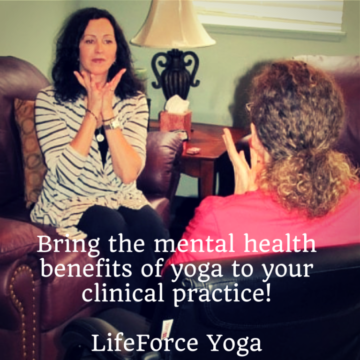
Every March, for the past ten years, I’ve lead practices on and off the mat at the Psychotherapy Networker Symposium, a mind-expanding four days of workshops, keynotes, dancing and schmoozing with old friends in Washington, DC. Many of the therapists in our breakout sessions have gone on to become LifeForce Yoga Practitioners and now integrate yoga-based practices into their sessions with clients.
They find that just a few minutes at the beginning of a psychotherapy session can make a significant difference in the outcome of that session and can bolster the ongoing work of therapy. For instance, when a clinician weaves in a yoga breathing exercise with a mudra (hand gesture) or a simple tone, the therapist finds the client is better able to focus and have access to feelings, without being overwhelmed by them.
None of the LifeForce Yoga practices used in a clinical setting require a mat, and they help the client to self-regulate at home. In the session, they help the client focus on the important issues in therapy. Psychotherapists I’ve trained often speak of how teaching a client a therapeutic yoga skill not only empowers the client to manage her mood, but in the act of practicing together, the therapeutic bond is strengthened. Sherry Rubin, a clinical social worker in Pennsylvania, and a LifeForce Yoga Mentor shared a note that her client had sent her. The client had been in treatment with Sherry before, and then returned, years later, after Sherry had begun integrating yoga-based practices into her clinical work. “When I came before,” the client wrote Sherry, “you helped me understand and get where I wanted to go. Now you show me yoga practices I use to help myself understand and get where I want to go.”
Therapists who suffer from burnout, having heard one traumatic tragedy too many, tell me that their clinical work feels fresh and exciting again. The LifeForce Yoga practices they teach to clients give the therapists a renewed energy and optimism, reinvigorating their clinical practices with moments of clarity, connection and, yes, even moments of bliss. I love sharing with clinicians ways in which they can enjoy their practice more and help their clients come to see who they really are beneath the story they’ve been repeating in therapy.
Belinda, a psychotherapist who works with adolescents, shared a story about her use of a practice I like to call Stair Step Breath (anuloma and viloma krama). Belinda taught this breathing practice that includes imagery to an intelligent, academically inclined adolescent boy named Stephen, who had been bullied by classmates for several years and had no friends. Stephen was not athletic and often felt humiliated in gym class when he was the last to be chosen for a team sport. The ringleader used the locker room as an opportunity to further shame Stephen for his slight stature and his mannerisms, which the bully identified as gay. Stephen had not experienced attraction to other boys, but the incessant taunts that followed him down the hallway and back into the classroom left him confused about his sexual orientation and deeply embarrassed in his school life.
Belinda worked with Stephen for several months and although his parents had intervened at the school on his behalf and the ringleader was no longer abusing him, Stephen’s depressed mood continued to deepen. He developed one physical symptom after another, and his absences from school increased. He lost interest in his studies and his grades declined. At home he was moody and often provoked fights with his younger sister, who was now accusing him of bullying her.
After Belinda attended LifeForce Yoga Practitioner training, she incorporated yoga tools into her work with clients and introduced Stephen to Stair Step Breath. She also encouraged his parents to practice it with him and gave them a CD to teach them how to do it. After 2 weeks of regular practice, Stephen was more energetic and came into sessions talking about guitar lessons. The next week he talked about a new friend who was into the same bands he liked. The friend was on the debating team and encouraged Stephen to join.
Within a month, Stephen was working hard at school, had won a debate, and was talking on the phone with a girl on the debating team. By the end of the semester, his grades had improved and Stephen was ready to terminate therapy. He said that he and his friends were signing up for a yoga class the next semester instead of gym.
Practice
The breathing practice Belinda taught Stephen includes visual imagery (bhavana) and is appropriate in both health care and home settings.
Stair Step Breath (Anuloma and Viloma Krama)
Stair Step Breath is a mildly energizing breath that is safe for most people. The activity in the practice gives the busy mind something to do, so it is appropriate for both anxiety and depression.
Note: Do not practice if you have had recent abdominal or chest surgery. Practice only on the inhalation if you are pregnant. The language and imagery here have been adapted for a health care setting.
 In a sitting or supine position, inhale through the nostrils little steps of breath, as though you are climbing a mountain (usually 4 to 8).
In a sitting or supine position, inhale through the nostrils little steps of breath, as though you are climbing a mountain (usually 4 to 8).- If it’s comfortable, sustain the breath for four counts (at the top of the mountain). Imagine that you are looking out at something beautiful. If holding the breath is uncomfortable, breathe naturally through the nostrils.
- Slide down the mountain. (Exhale slowly for six counts.)
- Practice steps 1–3 two times.
- Next take an elevator to the top of the mountain. (a smooth six-count breath in).
- Sustain for four counts. Imagine you can see something that makes your heart smile.
- Then step down the mountain (exhale through the nostrils in little puffs—usually 6 to 10).
- Practice steps 4–7 two times.
- Next take little steps up the mountain through the nostrils, as described above, pause for four counts with an image of beauty in your heart’s mind.
- Take little steps down the mountain, as described in #7. Practice this version of stepped breathing in and out two times.
- End by taking little steps up the mountain, sustaining the breath for four, then slowly glide down the mountain. You might wish to chant the mantra “so ham” (I am That) on the exhalation.
This blog post was adapted from Amy’s Chapter in the recently released book Darkness Before Dawn: The Journey Through Depression.
To learn more skills to incorporate in a mental health setting order a copy of Yoga Skills for Therapists.